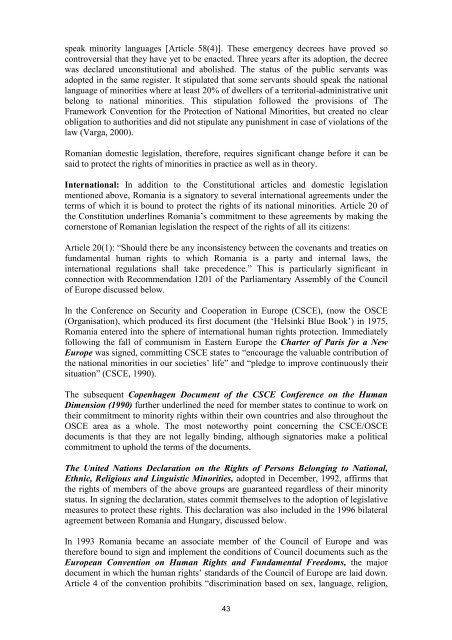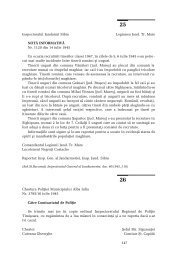Southeast Europe
Southeast Europe
Southeast Europe
Create successful ePaper yourself
Turn your PDF publications into a flip-book with our unique Google optimized e-Paper software.
speak minority languages [Article 58(4)]. These emergency decrees have proved so<br />
controversial that they have yet to be enacted. Three years after its adoption, the decree<br />
was declared unconstitutional and abolished. The status of the public servants was<br />
adopted in the same register. It stipulated that some servants should speak the national<br />
language of minorities where at least 20% of dwellers of a territorial-administrative unit<br />
belong to national minorities. This stipulation followed the provisions of The<br />
Framework Convention for the Protection of National Minorities, but created no clear<br />
obligation to authorities and did not stipulate any punishment in case of violations of the<br />
law (Varga, 2000).<br />
Romanian domestic legislation, therefore, requires significant change before it can be<br />
said to protect the rights of minorities in practice as well as in theory.<br />
International: In addition to the Constitutional articles and domestic legislation<br />
mentioned above, Romania is a signatory to several international agreements under the<br />
terms of which it is bound to protect the rights of its national minorities. Article 20 of<br />
the Constitution underlines Romania’s commitment to these agreements by making the<br />
cornerstone of Romanian legislation the respect of the rights of all its citizens:<br />
Article 20(1): “Should there be any inconsistency between the covenants and treaties on<br />
fundamental human rights to which Romania is a party and internal laws, the<br />
international regulations shall take precedence.” This is particularly significant in<br />
connection with Recommendation 1201 of the Parliamentary Assembly of the Council<br />
of <strong>Europe</strong> discussed below.<br />
In the Conference on Security and Cooperation in <strong>Europe</strong> (CSCE), (now the OSCE<br />
(Organisation), which produced its first document (the ‘Helsinki Blue Book’) in 1975,<br />
Romania entered into the sphere of international human rights protection. Immediately<br />
following the fall of communism in Eastern <strong>Europe</strong> the Charter of Paris for a New<br />
<strong>Europe</strong> was signed, committing CSCE states to “encourage the valuable contribution of<br />
the national minorities in our societies’ life” and “pledge to improve continuously their<br />
situation” (CSCE, 1990).<br />
The subsequent Copenhagen Document of the CSCE Conference on the Human<br />
Dimension (1990) further underlined the need for member states to continue to work on<br />
their commitment to minority rights within their own countries and also throughout the<br />
OSCE area as a whole. The most noteworthy point concerning the CSCE/OSCE<br />
documents is that they are not legally binding, although signatories make a political<br />
commitment to uphold the terms of the documents.<br />
The United Nations Declaration on the Rights of Persons Belonging to National,<br />
Ethnic, Religious and Linguistic Minorities, adopted in December, 1992, affirms that<br />
the rights of members of the above groups are guaranteed regardless of their minority<br />
status. In signing the declaration, states commit themselves to the adoption of legislative<br />
measures to protect these rights. This declaration was also included in the 1996 bilateral<br />
agreement between Romania and Hungary, discussed below.<br />
In 1993 Romania became an associate member of the Council of <strong>Europe</strong> and was<br />
therefore bound to sign and implement the conditions of Council documents such as the<br />
<strong>Europe</strong>an Convention on Human Rights and Fundamental Freedoms, the major<br />
document in which the human rights’ standards of the Council of <strong>Europe</strong> are laid down.<br />
Article 4 of the convention prohibits “discrimination based on sex, language, religion,<br />
43









